The Apple Varieties We Grow
People always ask us which apple variety is our favorite, and always our answer is the same – we don’t have one, we like them all! Really, every one has it’s completely unique character and flavor. Of the over twenty varieties we grow and/or carry, every one is a different experience. We focus heavily on the great varieties developed by the University of Minnesota apple breeding program over the last 100 years. Their solid and favorite Fireside, Haralson, Keepsake, Honeygold and Regent are the foundation of the Minnesota apple industry. Their newer release Honeycrisp has become a break out variety, soon to be followed by Zestar and SweeTango (MN 1914 -The Nest Big Thing!) The U of M develops apples that like our climate! Minnesota hardly ranks in the nation in terms of boxes produced every year, but what we lack in quantity we make up for in quality!
| Zestar – Large, crunchy, juicy red fruit with a sprightly sweet-tart flavor. Excellent for both fresh eating and cooking. The fruit will store for 6 to 8 weeks. Introduced in 1999. Origin: University of Minnesota, 1999 Size & Color: Big for a crab, up to 2″; orange with russet Flesh & Flavor: Crisp, fine, juicy, fruity and spicy Uses: Eating, as baked apples, can be canned whole Keeping: Two months Comments: One of the best eating apples anywhere Wealthy Origin: Excelsior, Minnesota by Peter Gideon, 1860. Named for his wife, Wealthy Gideon Parentage: Open pollinated Cherry Crabapple Size & Color: Medium; red wash over green/yellow Flesh & Flavor: Coarse, juicy, tart, winey Uses: Eating, fabulous apple pies Keeping: Six weeks Comments: Minnesota’s first commercial apple, huge success in its day. Parent of Haralson Haralson Firm texture with a complex tart flavor. Good for fresh eating and cooking. Especially good pie apple. The fruit will store for 4 to 5 months. Origin: University of Minnesota, released 1924 Parentage: Malinda x Wealthy Size & Color: Medium; broken red striping over green/yellow Flesh & Flavor: Crisp, very juicy, very lively sweet/tart with unique”ground” flavor Uses: Eating, pies, cider (when available, we use some Haralson in every gallon and all Haralson in every pie) Keeping: Outstanding condition until March 15 every year Honeycrisp – Large, dappled red fruit with a well-balanced flavor, outstanding crispness and juiciness. Best for fresh eating and salads as the flesh is slow to brown. Fruit will easily store 7 or more months, a benefit for small commercial growers. With more than 3 million trees planted, HoneycrispTM is easily the most popular U of M introduction to date. Origin: University of Minnesota, released 1991 Parentage: Keepsake x unknown Size & Color: Large; broken orange stripes over yellow Flesh & Flavor: Incredibly watermelon crisp with sweet, mild, clover honey flavoring Uses: Superb eating, all other uses as well Keeping: Superb storability until June of the year after harvest Cortland Origin: Cornell University, Geneva, New York, 1915 Parentage: McIntosh x Ben Davis Size & Color: Large with deep burgundy stripes over green/yellow Flesh & Flavor: Coarse, very white; rich, full, winey, aromatic flavor Uses: Eating, pies, sauce, cider (all purpose) Keeping: Three months McIntosh Origin: Dundela, Ontario, Canada, 1811 Parentage: Unknown. Discovered as wild seedling Size & Color: Medium; glossy red-maroon over green Flesh & Flavor: Fine, juicy, cidery Uses: Eating, apple sauce, pies, cider Keeping: Crisp for a month, less crisp for 6 months Sweet Sixteen – Crisp and juicy with an exotic yellow flesh and a very sweet, unusual sugar cane or spicy cherry candy flavor. The fruit stores for 5 to 8 weeks. Tree is very vigorous and fruit may be subject to premature drops. Origin: University of Minnesota, released 1977 Parentage: MN 447 x Northern Spy Size & Color: Toward large with two-tone red striping overall Flesh & Flavor: Crisp and juicy; spectacularly sweet! Uses: Eating Keeping: About two months, maybe less Comments: Actually gets over-sweet and gains licorice (anise) flavor Prairie Spy Origin: University of Minnesota, released 1940 Parentage: Unknown Size & Color: Usually medium; cherry red over green/yellow Flesh & Flavor: Tight, crisp, dryish; unique, complex, nutty plus citric flavor Uses: Outstanding eating, pies, cider, and as baked apples Keeping: Keeps very well into mid-January, then wanes thru March Regent Appealing red-striped apple with well-balanced flavor that is good for eating and cooking. The fruit will store for 4 to 5 months. Origin: University of Minnesota, released 1964 Parentage: Red Duchess x Red Delicious Size & Color: Medium; bright red striping over yellow Flesh & Flavor: Crisp, sweet with a hint of starch, juicy and flavorful Uses: Eating and all other uses Keeping: Crisp to Christmas, then softer Comments: Appearance is very similar to Haralson. Fireside Very large fruit with sweet flavor and fine-grained flesh good for fresh eating, salad, and baked apples. Tree is vigorous and weeping. Introduced in 1943. Origin: University of Minnesota, released 1943 Parentage: McIntosh x Longfield Connell Red Fireside: MN 1622 Keepsake | 
|










